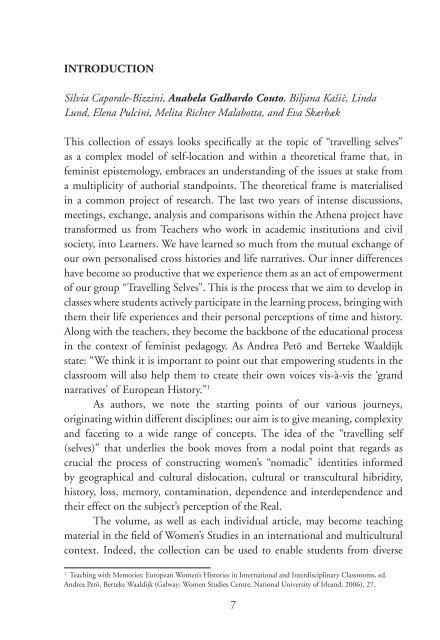Teaching Subjectivity. Travelling Selves for Feminist ... - MailChimp
Teaching Subjectivity. Travelling Selves for Feminist ... - MailChimp
Teaching Subjectivity. Travelling Selves for Feminist ... - MailChimp
Create successful ePaper yourself
Turn your PDF publications into a flip-book with our unique Google optimized e-Paper software.
INTRODUCTION<br />
Silvia Caporale-Bizzini, Anabela Galhardo Couto, Biljana Kašić, Linda<br />
Lund, Elena Pulcini, Melita Richter Malabotta, and Eva Skærbæk<br />
This collection of essays looks specifically at the topic of “travelling selves”<br />
as a complex model of self-location and within a theoretical frame that, in<br />
feminist epistemology, embraces an understanding of the issues at stake from<br />
a multiplicity of authorial standpoints. The theoretical frame is materialised<br />
in a common project of research. The last two years of intense discussions,<br />
meetings, exchange, analysis and comparisons within the Athena project have<br />
trans<strong>for</strong>med us from Teachers who work in academic institutions and civil<br />
society, into Learners. We have learned so much from the mutual exchange of<br />
our own personalised cross histories and life narratives. Our inner differences<br />
have become so productive that we experience them as an act of empowerment<br />
of our group “<strong>Travelling</strong> <strong>Selves</strong>”. This is the process that we aim to develop in<br />
classes where students actively participate in the learning process, bringing with<br />
them their life experiences and their personal perceptions of time and history.<br />
Along with the teachers, they become the backbone of the educational process<br />
in the context of feminist pedagogy. As Andrea Petö and Berteke Waaldijk<br />
state: “We think it is important to point out that empowering students in the<br />
classroom will also help them to create their own voices vis-à-vis the ‘grand<br />
narratives’ of European History.” 1<br />
As authors, we note the starting points of our various journeys,<br />
originating within different disciplines; our aim is to give meaning, complexity<br />
and faceting to a wide range of concepts. The idea of the “travelling self<br />
(selves)” that underlies the book moves from a nodal point that regards as<br />
crucial the process of constructing women’s “nomadic” identities in<strong>for</strong>med<br />
by geographical and cultural dislocation, cultural or transcultural hibridity,<br />
history, loss, memory, contamination, dependence and interdependence and<br />
their effect on the subject’s perception of the Real.<br />
The volume, as well as each individual article, may become teaching<br />
material in the field of Women’s Studies in an international and multicultural<br />
context. Indeed, the collection can be used to enable students from diverse<br />
1<br />
<strong>Teaching</strong> with Memories: European Women’s Histories in International and Interdisciplinary Classrooms, ed.<br />
Andrea Petö, Berteke Waaldijk (Galway: Women Studies Centre, National University of Irleand, 2006), 27.<br />
7

















